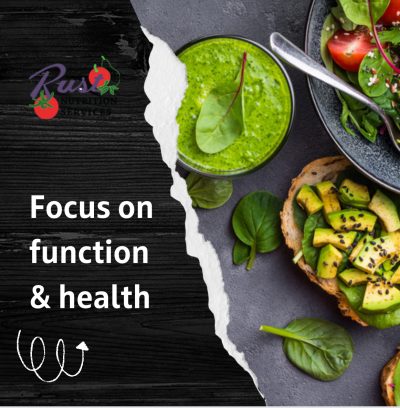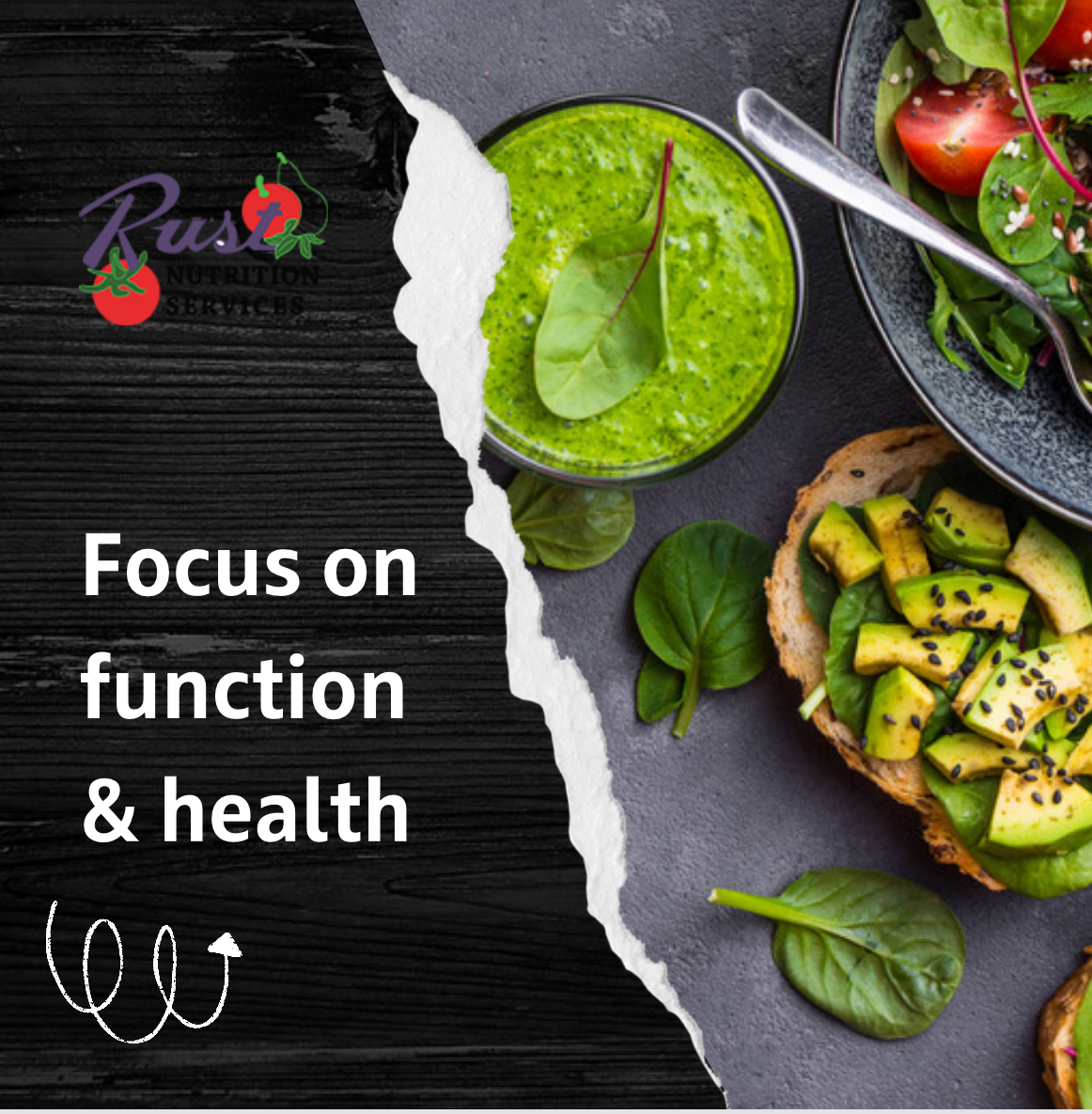Table of Contents
We are about to embark on the diet industry’s favorite month: January. It is hard to believe that the endless cycle of shame, weight loss, weight re-gain, continues to grab people’s attention.

It’s perfectly fine to want to take care of yourself and get back to “normal eating” after a season of overindulgence or disruptive schedules. However the only way to stop the yo-yo cycle of weight (loss and regain, year after year) it is to stop restricting calories. Going “on” then “off” weight loss diets only fuels shame and disappointment.
Do something different from now forward.
Focus on Function
Rather than focusing on your body weight, focus on body function. How your body feels, moves, and works. We now know that everyone who is overweight is not overweight for the same reasons. It’s more than “calories in and calories out”. Whether you have a family history of obesity, are in the middle of a life transition or crisis, have medical issues that make weight loss challenging, or are experiencing mid-life changes – managing your weight is no simple task.
When Seeing is not Believing
Don’t let the images you see online get into your head. Today’s world is filled with disinformation and photo-shopped images. With the rapid growth of artificial intelligence applications, it’s only going to get more and more dystopian. Rather than fixate on the scale, choose an eating plan that you can sustain year round.
Fitness is also important. Set some goals to keep your body in motion and stay (or get) fit. This includes daily movement up or down stairs, walking more during your errand runs, or cleaning the house.
Get Your Head on a Positive Track
Health is a mindset as much as it is your physical self. Some aspects of your body are not in your control. Nobody, at any age, is going to eat a perfectly balanced diet every day. By now I hope you understand that bodies, by nature, come in different shapes and sizes. There is no “perfect body”. There is your body – take care of it.
Your body does however require certain nutrients to function at its best. Depending on which stage of life you are in, consider these tips:
Youth: 18-25
It may be hard to prioritize nutrition at this stage in life, but the habits you set up now can set you up for healthy eating throughout your adult life. There’s no need to worry about eating “too much” – a restrictive diet mentality does not serve anyone.
These years are a time of continued physical development. On the other hand, you still want to balance your plate when you can, by adding quality nutrition to your diet.
- Key nutrients can be found in whole foods. Include good sources of calcium (milk, yogurt, cheese, plant-based beverages, spinach), vitamin D (vitamin D-fortified foods, mushrooms, tuna, salmon), potassium (beans, potatoes, berries, citrus, bananas), and fiber (legumes, fruits and veggies, whole grains).
- Instead of take-out every night, opt for some convenience foods that are easy to prep at home. Grab a rotisserie chicken, make some quick rice with frozen veggies. Keep frozen veggie dumplings in the fridge when the craving hits. Build your own lunch with pouch tuna, a whole wheat pita, and some salad greens. Scramble up some eggs. Add frozen veggies and leftover chopped meat, tofu, or beans to ramen noodles
- Make fast food choices more balanced and less frequent. Add a salad, veggies option, or a fruit cup to your meal. Skip the soda.
- Stay active. After high school, there are many transitions and it’s easy to slack off on fitness. You may be on your own at a job, or attending college. Think about the kind of activities you enjoy. A pick-up basketball game; a short evening jog; or try a simple routine from home like morning push-ups, floor exercises, or yoga.
- Sugar isn’t “toxic”, but keep an eye on it. Sugary foods or beverages can displace nutritious ones, and leave you short on nutrition. Including too much sugar in your diet can worsen acne or psoriasis as well.
- Watch out for extra liquid calories. Alcohol is calorie-dense. One drink, whether it’s a beer, wine or mixed drink, is delivering 150 calories or more. It’s fine to enjoy a soda or another sweet treat now and then. However overall, it’s a good idea to limit the added sugars in your diet. For instance your favorite coffee drinks can add up, so save them for an occasional treat and ask for only “1 or 2 pumps” of sweet syrups.
Young Adulthood: 26-39
At this point in life your body is settling into its adult form. You are done growing, so your metabolism is slowing down a bit (meaning your calorie requirement is lower than is had been).
- It’s time to really learn how to cook. Eating out if fun and easy, but also expensive. In addition, while delicious, many restaurant meals are high in fat and sodium – two components of the diet that need to be monitored as you age. This is the perfect time to learn some basic cooking skills. Find your niche, whether it’s a slow-cooker, instant pot, or cast iron pan.
- Women who plan to have children should take special care to maintaining good nutrition. In addition to vitamin D, potassium, iron and folic acid are important. A simple way to ensure you are getting the iron and folic acid you need is to include a bowl of cereal most mornings or dark leafy greens with dinner. Women generally need less calories than men, but it depends on your physical activity.
- Continue to choose a physical activity that you enjoy and can stick with. You don’t have to be a gym-goer (I find pushups to be a quick fitness test. You should be able to do 3 or more push-ups at almost any age). Moving in your spare time is good for your physical and mental health. It can help clear your head, build and maintain muscle, and keep your body functioning well.
- If you haven’t checked out your family medical history yet, these are the years to do it. The ailments of your parents and grandparents are part of your genetics – knowing this history helps you prevent advanced disease. You don’t have total control over whether you develop high blood pressure or diabetes, but you can start making lifestyle changes now (no smoking, less saturated fat, less sugar, less salt, more movement) now.
- By your 30s, you should be scheduling an annual exam with your doctor simply as a check up. This is when problems can be caught before they get any worse. This also allows you to talk about any health issues you might be dealing with.
- Take a look at alcohol. “Moderate” drinking is considered less than 2 drinks per day. While no amount of alcohol is recommended, limiting how much and how often you drink it a smart choice.
Midlife: 40-65
These years sneak up on you, and generally require a few changes. You may find you can’t eat as much and maintain your younger weight. And you might see that you lose muscle more quickly, or gain weight around your mid-section. These are all normal changes of midlife.
- During these years you may find that you’ll have to tweak your “usual” diet and fitness routines. As you age, carbohydrate metabolism is not as robust, and our bodies lose muscle more quickly and recover less quickly.
- Add some low fat protein to each meal to help support muscle mass. Cut back on sweets and balance starchy carbohydrate foods with more vegetables at meals.
- Pump it up. Weight lifting and resistance exercise can help support your aging bones, help you maintain good balance (to prevent falls), and supports a healthy metabolism. To prevent injury, consider enlisting a personal trainer to get you started if you aren’t experienced.
- Add cardiovascular exercise after you check in with your doctor. If you haven’t had an annual physical exam in a while, these are the years that becomes crucial. Getting your bloodwork checked once a year helps your doctor evaluate your health and provide any treatment you may need. Reducing the risk of disease can help keep you well, or preventing problems from getting worse.
Later life: Over 65
Aging is a gift. Your body at age 65 is not going to look like it did at 35, and that’s okay. Fitness continues to be important, especially for function. You want to maintain good balance and strength at this stage in life so you can continue to do things you enjoy, without injury.
As far as nutrition, these years look similar to the previous, but you can modify as needed.
- To maintain muscle mass, be sure you are getting adequate protein (15-30 grams) at each meal. Continue to do some strength training exercises to maintain muscle as well.
- Continue to include fruits and vegetables. Choose frozen or canned when convenience is useful.
- Ask your doctor about B12. As you age, the body’s ability to absorb this vitamin diminishes.
- Stay hydrated. As you age, your thirst signals aren’t what they used to be. Drink more water even when you aren’t thirsty. Sipping on 3 pints of water a day is a good idea (you’ll get water from some foods and other beverages too).
- Stay social. Wellness is also about maintaining social connections. Share meals with family or friends when possible.
Hope you can embrace good nutrition, movement you enjoy, rest, and a positive mindfulness this year and forever.





More Stories
United Healthcare’s ransomware attack shows why supply chains are under siege
Nutrition Tips For Ramadan | JM Nutrition
Probiotics for IBS | The Nutritionist Reviews